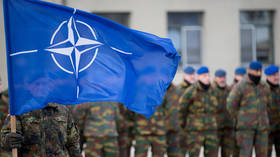Russia to create ‘counter-threats’ if West snubs its security proposals
18 Dec, 2021 23:31
The comprehensive security deal, proposed to the US and NATO, serves the best interests of all the parties involved, and is designed to avoid potential military showdown through political dialogue, Russia’s Deputy Foreign Minister Alexander Grushko said Saturday.
“[By proposing the deal] we make it clear that we are ready to talk about how to transform a military or a military-technical scenario into a political process that will strengthen the military security of all states within The Organization for Security and Co-operation in Europe (OSCE), Euro-Atlantic area and Eurasia,” Grushko told the Soloviev LIVE YouTube channel.
Should the West ignore Moscow’s attempt to bring the tensions down, Russia will resort to “creating counter-threats” of its own, the minister said, referring to potential deployment of new weapons systems within Russia's borders.
“It will be too late then to ask us why we've made such decisions, why we've deployed such systems,” he said.
Arguing that increasingly strained Russia-NATO relations reached “the moment of truth” which called for a “fundamental decision,” the minister stressed that the ball is now in NATO’s court.
"We have taken this step and proceed from the fact that it will no longer be possible to somehow brush it [the security proposals] off.”
The idea of a comprehensive, legally binding security agreement with the West was first floated by Russia’s President Vladimir Putin. Moscow has insisted that any dealings with the US-led NATO bloc and the US in particular, must come in a form of written guarantees.
Two separate draft documents, presented by Russia to NATO and the US earlier this week laid out the main principles of peaceful coexistence of Russia and the US-led military block in Europe. Unveiling the proposals, Russian Deputy Foreign Minister Sergey Ryabkov explained that Moscow insists on written guarantees since the ties with the West currently suffer from “an almost total lack of mutual trust.” Ryabkov pointed out that many verbal promises, given by Western politicians to Russia back in 1990, including NATO’s pledge to not expand eastwards, have been broken.
The proposal to NATO demands the block stop its expansion towards Russia’s borders and refrain from stationing forces in the former Warsaw Pact member-states. Under the proposed security deal, Moscow and NATO also pledge to not place intermediate and short-range missiles near each other’s territory. The proposal to the US mirrors that to NATO, while also calling on Washington to agree not to use the territory of other states for the purpose of preparing or launching a military attack on each other.


0 Comments:
Post a Comment
Subscribe to Post Comments [Atom]
<< Home